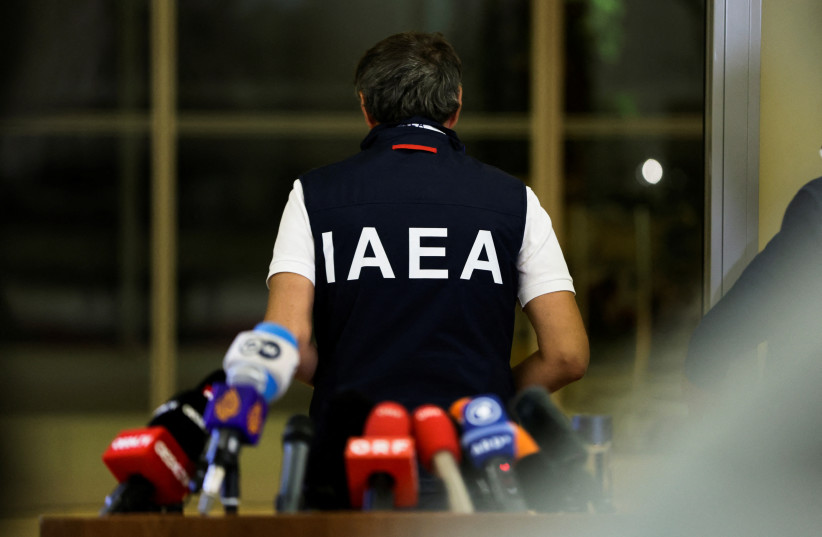France, Britain and Germany said they doubted Iran wanted to revive the 2015 nuclear deal as Israeli Prime Minister Yair Lapid was set to depart for Germany on Sunday in hopes of swaying Berlin to abandon the agreement altogether.
"Iran continues to escalate its nuclear program way beyond any plausible civilian justification," the E3 said in a joint statement.
Their statement came after hope had been raised that the European Union, which has held indirect talks between the United States and Tehran for the last year-and-a-half, was on the edge of reviving the deal.
One of the main sticking points has been Iran's insistence that the International Atomic Energy Agency must close its probe into traces of uranium found in undeclared nuclear sites.
"While we're edging closer to an agreement, Iran reopened separate issues that relate to its legally binding international obligations under the Non-Proliferation Treaty (NPT) and its NPT safeguards agreement concluded with the International Atomic Energy Agency (IAEA)," the E3 said.

The initial deal designed to curb Iran's nuclear program and prevent its production of nuclear weapons, known as the Joint Comprehensive Plan of Action was initially signed between Tehran and the six world powers: the United States, Russia, China, France, Great Britain and Germany.
Former US President Donald Trump exited the deal in 2018 and US President Joe Biden has sought to revive it, but that option now seems unlikely unless a resolution can be found to the issue of the IAEA probe, which Tehran wants to close.
"This latest demand raises serious doubts as to Iran’s intentions and commitment to a successful outcome on the JCPoA. Iran’s position contradicts its legally binding obligations and jeopardizes prospects of restoring the JCPoA," the E3 explained.
"In June, the IAEA Board of Governors adopted, by an overwhelming majority, a resolution calling on Iran to take urgent action to answer the Agency’s outstanding questions," the E3 stated. "Three months later Iran has taken no steps at all as confirmed by the IAEA Director General’s latest report," it stated.
"Our position remains clear and steadfast. Iran must fully and, without delay, cooperate in good faith with the IAEA. It is up to Iran to provide technically credible answers to the IAEA’s questions on the whereabouts of all nuclear material on its territory.
"The JCPoA can in no way be used to release Iran from legally binding obligations that are essential to the global non-proliferation Regime," the E3 stated.
Iran's Foreign Ministry spokesperson Nasser Kanaani said the E3 statement was "unconstructive," adding "the three European countries are advised to play a more active role in providing solutions to end the few disagreements that remain," state media reported.
US Secretary of State Antony Blinken told reporters in Brussels on Friday that Iran's "latest response takes us backwards.
"We are not about to agree to a deal that doesn’t meet our bottom line requirements and/or that tries to continuously introduce extraneous demands that are not relevant to the JCPOA itself," he continued.
"If we conclude a deal, it’s only because it will advance our national security. The President is focused on that, and what we’ve just seen again would appear to move us backward, not forward."
National security spokesman John Kirby said Washington would remain active in pushing for the reimplementation of the agreement, but its patience was "not eternal."
"Even as he has fostered and encouraged and pushed for a diplomatic path, (Biden) has conveyed to the rest of the administration that he wants to make sure that we have other available options to us to potentially achieve that solid outcome of the no nuclear weapons capability for Iran," he said.
Israel opposed both the initial 2015 JCPOA and the Biden Administration's attempts to revive it. It has spoken with the US and the E3 about the danger of the deal, which it believes is not a strong enough agreement to prevent a nuclear Iran.
Herzog raised the matter in his meeting with German Federal Chancellor Olaf Scholz and spoke publicly about the matter in his address to the Bundestag.
“The international community must stand on the right side of history, set clear conditions, impose fierce and essential sanctions, create an impermeable buffer between Iran and nuclear capabilities—it must act, and not back down.
"The State of Israel will defend itself and will fight by all means necessary against threats to it and to its citizens. I call on the whole world: don’t stand idly by," Herzog said.
But some Israelis have supported the deal. Former IDF Chief-of-Staff Gadi Eisenkot, who is number three in the National Unity Party told Channel 12 on Saturday night, that "It was a serious mistake to withdraw from the nuclear agreement with Iran in 2018.
"That year we were able to say that the nuclear program was stopped and rolled back," he said.
Reuters contributed to this report.
